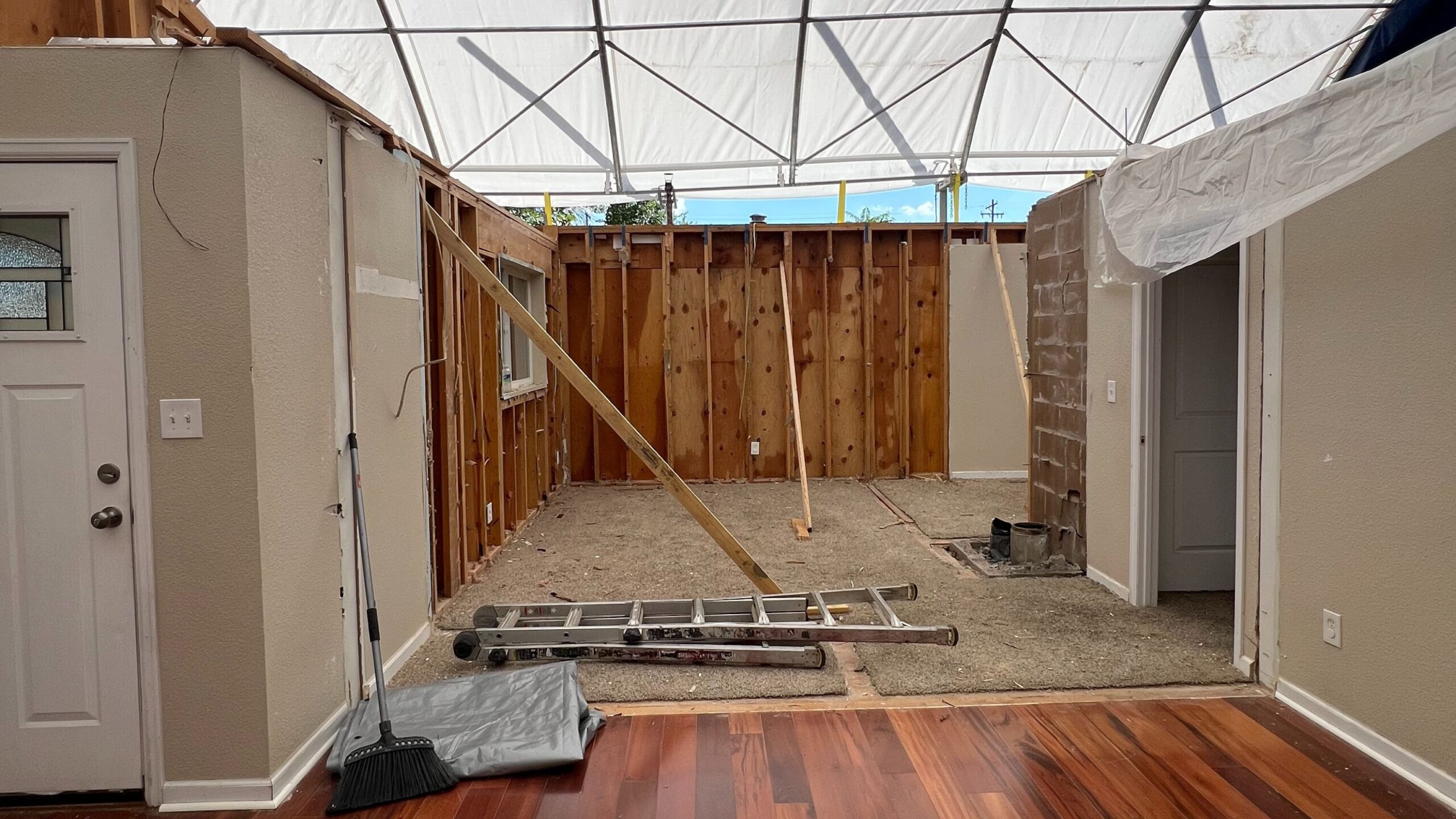
Rough framing and demolition of a home in Denver by Sustainable Design Build.
If you’re planning a home addition, you may be asking: do I need a general contractor? For large or complex projects involving multiple trades, structural changes, or luxury finishes, a GC is often the right choice. However, homeowners in Denver are increasingly turning to design-build firms like Sustainable Design Build for an even more streamlined solution.
When planning a home addition, one of the first questions homeowners ask is whether to hire a general contractor (GC). The answer depends largely on the size, complexity, and goals of your project. While some smaller projects may be managed with specialized trades, larger and more intricate renovations typically benefit from the oversight of a seasoned general contractor. However, for many homeowners, the design-build approach offers an even more streamlined and efficient solution.
When to Hire a General Contractor
A general contractor is best suited for large, complex projects that involve multiple trades and demand precise coordination. Some of the most common scenarios where hiring a GC makes sense include:
Large-Scale Projects
For full-scale renovations, custom builds, or projects involving major structural changes, a general contractor provides the project management expertise needed to keep all the moving parts aligned.
Multiple Trades
If your home addition requires different specialists, such as plumbers, electricians, HVAC technicians, and painters, a GC ensures these trades work together smoothly and efficiently.
Complex Systems
Projects involving updates to critical systems like electrical, plumbing, or HVAC benefit from a GC’s ability to manage compliance with building codes and guarantee seamless integration.
High-End Customization
For projects with custom finishes, luxury features, or intricate design details, a general contractor can manage specialty suppliers and ensure that premium standards are met.
Saving Time and Reducing Stress
A general contractor has access to a network of reliable vendors and subcontractors, and their project oversight can minimize delays, miscommunication, and costly mistakes.
Ensuring Quality and Code Compliance
Experienced contractors bring knowledge of local regulations and permitting requirements. This expertise reduces the risk of errors and ensures quality control throughout the build.
When a General Contractor May Not Be Necessary
Not every project requires a general contractor. For smaller, simpler projects, hiring directly with a specialized trade may be more cost-effective.
- Small, Focused Projects: Examples include a single plumbing upgrade or a minor electrical repair.
- Owner-Managed Projects: If you have construction knowledge, the ability to dedicate significant time, and are comfortable managing risks, you may act as your own general contractor (though this is a heavy responsibility).
In short, the decision hinges on scope, complexity, budget, and available time.
How to Decide
When deciding whether to hire a general contractor, ask yourself:
- What is the scope? Larger, more intricate projects favor a GC.
- Do I have time and expertise? Managing multiple subcontractors and permits can quickly overwhelm inexperienced homeowners.
- How will costs compare? While a GC charges a management fee (typically 10–25%), they often negotiate better rates with subcontractors and suppliers, which can offset expenses.
- What is my timeline? Long-term or multi-phase projects are more efficiently managed by an experienced professional.
Why a Design-Build Firm Can Be a Better Option
While general contractors are a solid choice for many homeowners, design-build firms like Sustainable Design Build offer an even more integrated approach. Instead of separating design and construction into two different contracts, design-build unifies both under one entity. This creates a streamlined experience for homeowners with several key benefits.
What Is Design-Build?
- Single Point of Responsibility: Homeowners sign one contract with a single team that manages both the design and construction.
- Integrated Teamwork: Designers, architects, and builders collaborate from the very beginning, ensuring consistency between vision and execution.
- Collaborative Process: This close partnership reduces miscommunication and fosters innovation at every stage.
Key Benefits of Design-Build
- Faster Delivery: Overlapping design and construction phases can accelerate project timelines.
- Cost Savings: Efficiency and innovation within an integrated team often lower overall costs.
- Better Quality: Continuous collaboration leads to cohesive, higher-quality results.
- Reduced Owner Burden: Homeowners avoid juggling multiple contracts and instead work with a single, accountable entity.
- Lower Litigation Risk: A single contract reduces disputes and warranty gaps common in traditional project delivery.
Potential Challenges
While design-build offers compelling benefits, homeowners should be aware of considerations:
- Initial Cost Perception: The upfront contract may look higher since design and construction are bundled together, though efficiencies typically offset this over time.
- Collaborative Management: A high level of team communication is necessary to maintain quality and progress.
Why Sustainable Design Build Is the Right Partner
As a Denver-based design-build company, Sustainable Design Build specializes in home additions, custom builds, and luxury remodels. By combining design and construction expertise under one roof, SDB ensures that every project is delivered with efficiency, precision, and collaboration. This approach not only simplifies the homeowner’s experience but also helps deliver projects on time, on budget, and at a level of craftsmanship that stands out in the marketplace.
For homeowners asking, “Do I need a general contractor for my home addition?”, the answer often depends on project size and complexity. But for those seeking a comprehensive solution that unites design and construction into one streamlined process, partnering with a design-build firm like Sustainable Design Build may be the smartest choice.
References
- American Institute of Architects. (2023). Project delivery methods: A comparison.
- Design-Build Institute of America. (2024). What is design-build?.
- Sustainable Design Build. (2025). ADU construction services.
Connect With Us
Planning your next renovation, or maybe you are looking to do a complete remodel for your home? Whatever the task, it can’t hurt to ask. Reach out to our team through this form.
We can schedule a free consultation and discuss everything you need to get your project moving in the right direction. Did we mention, it’s absolutely free?
